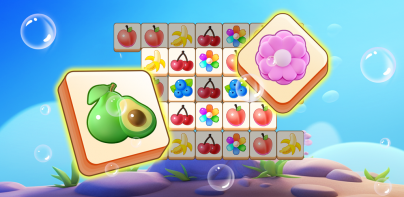


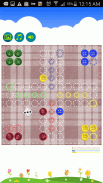
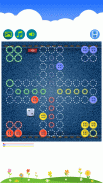
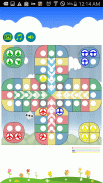

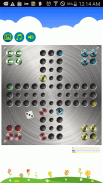
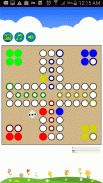
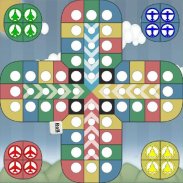


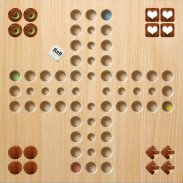
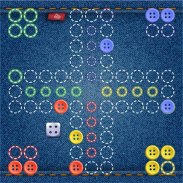
Ludo

คำอธิบายของLudo
Ludo เป็นเกมกระดานข้ามและวงกลมที่คล้ายกับ patolli และ Wahoo ซึ่งเกี่ยวข้องกับการเคลื่อนย้ายชิ้นส่วนหรือลูกแก้วจำนวนหนึ่งไปรอบ ๆ กระดานเพื่อพยายามนำพวกมันเข้าสู่โซนปลอดภัย
เกม Uckers และ Chaupar นั้นคล้ายกับเกม Ludo โดยมีกฎที่แตกต่างกันเล็กน้อย
Mensch เป็นเกมกระดาน ที่พัฒนาโดย โจเซฟ ฟรีดริช ชมิดต์ ในปี 1907 หรือ 1908
เกมดังกล่าวเปิดตัวในปี 1914 และขายได้ประมาณ 70 ล้านชุด โดยได้รับแรงหนุนจากความนิยมอย่างมากในหมู่กองทหารเยอรมันที่ประจำการในสงครามโลกครั้งที่ 1 เกมนี้เป็นเกมข้ามและวงกลมที่มีวงกลมยุบลงบนไม้กางเขน คล้ายกับเกมอินเดีย Pachisi เกม Parqués ของโคลอมเบีย เกมสเปน Parchís the American games Parcheesi (Parchisi) Aggravation and Trouble the English game Ludo
กฎการเล่น Ludo:
- จำนวนผู้เล่น: 2 ถึง 4 คน
- เป้าหมาย: เป็นผู้เล่นคนแรกที่ย้ายหมากของตัวเองทั้งหมดออกจากพื้นที่เริ่มต้น รอบกระดาน และกลับบ้าน
- การตั้งค่า: ผู้เล่นจะต้องโยน 6 เพื่อย้ายหมากจากวงกลมเริ่มต้นไปยังช่องแรกของสนามแข่ง และการโยน 6 ครั้งจะให้อีกตาหนึ่ง
- การเล่น: ผู้เล่นผลัดกันเล่นตามเข็มนาฬิกา การโยนลูกเต๋าสูงสุดเริ่มต้น
การโยนแต่ละครั้ง ผู้เล่นจะเป็นผู้ตัดสินใจว่าจะย้ายหมากตัวไหน ชิ้นส่วนจะเคลื่อนที่ในทิศทางตามเข็มนาฬิการอบแทร็กตามหมายเลขที่โยน หากไม่มีหมากที่สามารถเคลื่อนที่ได้อย่างถูกกฎหมายตามจำนวนที่โยน การเล่นจะผ่านไปยังผู้เล่นคนถัดไป
หากหมากตกลงบนหมากที่มีสีต่างกัน หมากที่กระโดดจะกลับไปที่วงกลมเริ่มต้น
หากหมากตกลงบนหมากที่มีสีเดียวกัน จะทำให้เกิดบล็อก บล็อกนี้ไม่สามารถผ่านหรือลงจอดโดยหมากฝ่ายตรงข้าม
- ชนะ: เมื่อตัวหมากเดินวนรอบกระดานแล้ว ตัวหมากจะเลื่อนขึ้นไปบนเสาหลัก หมากสามารถย้ายไปยังสามเหลี่ยมบ้านได้โดยการโยนที่แน่นอนเท่านั้น
คนแรกที่ย้ายหมากทั้ง 4 ชิ้นเข้าไปในสามเหลี่ยมบ้านจะเป็นผู้ชนะ









